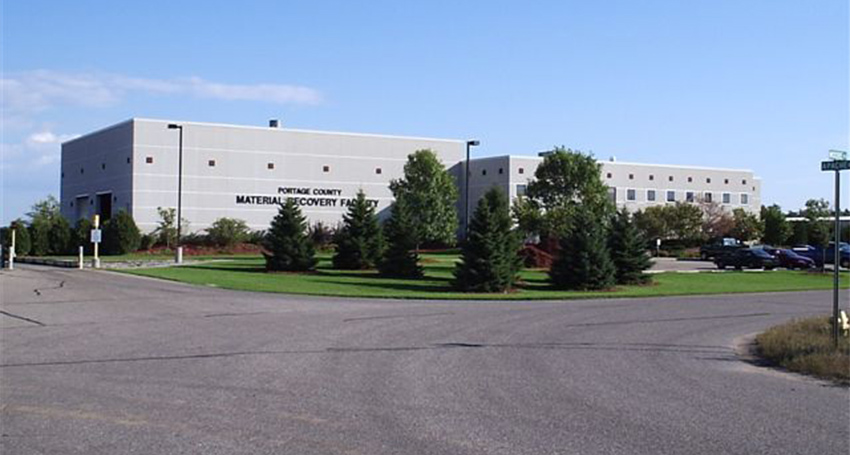Column: Improper battery disposal can start a fire
By Amanda Haffele
I’m writing this month to remind the public of the dangers of throwing batteries, electronics, and other battery-containing materials that could cause a fire in the trash or recycling.
Since December of last year, there have been large damaging fires at three Wisconsin recycling facilities; Columbia County, the City of Milwaukee, and Whitewater. While it’s hard to pinpoint the exact cause of each of these fires, many batteries, especially lithium-ion batteries found in many electronics, can cause fires when not disposed of properly. Many smaller fires, which occur weekly in the solid waste and recycling industry, have been attributed to batteries.
If not caught early these fires can quickly spread and injure workers or firefights, cause major damage to equipment, or even destroy an entire facility.
Batteries are found in everything from cell phones to clock radios to hearing aids. They come in all shapes and sizes and are grouped into four main categories: alkaline, lithium, rechargeable, and button. While some batteries are considered hazardous waste, others are not.
Here’s a quick guide on deciphering what’s what when it comes to batteries:
Alkaline Batteries
Single-use alkaline batteries can be identified as such on the battery’s side. While these batteries used to be considered hazardous waste, they can now be tossed into normal household trash once they no longer have a charge. In the mid-1990s, the background mercury placed inside alkaline batteries was phased out, making these batteries no longer a threat to our environment as before. Portage County Solid Waste and Batteries Plus will recycle them, as well, for a fee.
Rechargeable Batteries
Rechargeable batteries, which include lithium-ion, should be recycled. Rechargeable batteries can be found in power towels, laptops, cameras, electronics, and more. Recycle these batteries at no charge in a Call2Recycle box located at the Portage County Solid Waste Office in Plover or the service desk at Lowes.
No fees are associated with recycling rechargeable batteries at these two locations, due to the commitment by voluntary companies who pay a license fee to place the Call2Recycle Battery Seal on their rechargeable battery and/or battery-powered products. License fees fund the collection and recycling of used rechargeable batteries and a nationwide education program about rechargeable battery recycling. To learn more about this program visit Call2Recycle.org.
Batteries Plus in Stevens Point recycles them for a fee.
Rechargeable batteries can swell for various reasons, some being old age, damage, and defects. Swollen batteries are like little pressure-cooker bombs just waiting to go off and cause a fire. These batteries are generally lithium-ion in chemistry. The best thing to do if you find a swollen battery is to place the battery or the entire device into a metal container. Ideally place kitty litter, Oil-Dri, or sand over the top and then store it in a safe place until you can bring it to the Portage County Transfer Facility for proper disposal. We’ll take it from there.
Single-use Lithium Batteries
Lithium batteries, not to be confused with alkaline or rechargeable lithium-ion batteries, are hazardous and must be recycled at the Portage County Solid Waste Facility in Plover or Batteries Plus in Stevens Point. Same as single-use alkaline batteries, lithium batteries are identified as lithium on the battery’s side. These batteries are highly reactive at normal temperatures and can easily ignite if terminals are rubbed together.
These batteries have been known to cause explosions and fires during transport and at recycling facilities. For this reason, always wrap, tape, or bag these batteries separately while storing them. There is a fee to recycle single-use lithium batteries. Always use clear tape when taping terminal ends so we can determine the battery’s chemistry.
Button Batteries
Button batteries are flat round batteries that are commonly found in hearing aids, watches, solar lights, and cards with sound, and are “hidden” in many other objects.
Button batteries may contain lead, nickel, silver, cadmium, lithium, or other heavy metals that may contaminate groundwater or soil, harming humans and animals alike if disposed of improperly. The best method for taping the terminal ends of button batteries is to use the sandwich method. Lie a piece of clear packaging tape on a flat surface, sticky side up. Arrange the batteries across the tape’s surface and then place a final layer of tape on top.
Portage County Solid Waste does not want to be the next victim of an improperly disposed of battery or battery-containing device. Please dispose of these items properly. We accept all types of batteries and electronics, some for a fee, others for free. Batteries Plus in Stevens Point accepts most kinds of batteries for a fee. Lowes in Plover accepts rechargeable batteries only, at no charge.
As always, if you have any questions give us a call at (715) 343-6297, visit us online at www.co.portage.wi.us/department/solidwaste, or like us on Facebook facebook/PortageCountyRecycles.
Amanda Haffele is the solid waste director for Portage County.


